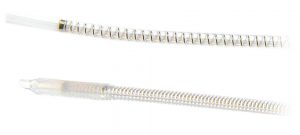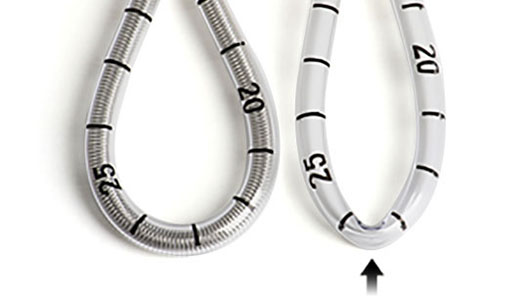 Tubing reinforcement is useful in a medical setting to provide a level of flexibility that a solid tube does not. By providing outside pressure against the inside of the tube wall, coils can add crush resistance and increased durability as well. Medical tubing manufacturers require medical-grade reinforcement wire coils, also known as “helical coils”, which are used in their tubing extrusion processes. Guidewire tip coils can offer further flexibility to the lead-end of the wire during critical medical procedures.
Tubing reinforcement is useful in a medical setting to provide a level of flexibility that a solid tube does not. By providing outside pressure against the inside of the tube wall, coils can add crush resistance and increased durability as well. Medical tubing manufacturers require medical-grade reinforcement wire coils, also known as “helical coils”, which are used in their tubing extrusion processes. Guidewire tip coils can offer further flexibility to the lead-end of the wire during critical medical procedures.
Catheter Reinforcement Coils
 Wire coiling plays a very important role in the manufacturing of catheters – the thin, tubular medical devices used widely in the healthcare industry. Because catheters are inserted into the body either intravenously to deliver fluids and medication into the bloodstream, or via the urethral opening to empty the patients’ bladder, they must be flexible enough to maneuver yet firm enough to insert and resist kinking or collapsing during use.
Wire coiling plays a very important role in the manufacturing of catheters – the thin, tubular medical devices used widely in the healthcare industry. Because catheters are inserted into the body either intravenously to deliver fluids and medication into the bloodstream, or via the urethral opening to empty the patients’ bladder, they must be flexible enough to maneuver yet firm enough to insert and resist kinking or collapsing during use.
To strike the perfect balance, manufacturers choose a coil-reinforced design whereby a soft medical-grade plastic is used for the catheter’s tube and an internal helical coil spring is added within for reinforcement. Bob Boldig, president of Custom Wire Technologies, describes the reinforcement coil’s function as a way of providing “flexible rigidity” to a catheter. “It allows the catheter shaft to be flexible yet resist crushing,” he adds.
Coils for Guidewire Tips
Coils also prove essential during the manufacturing of guidewires, which are much smaller devices used to guide catheters to reach a lesion or vessel segment. “Guidewire tip coils provide an atraumatic flexible tip to the wire,” explains Boldig. “Based on material, these can also provide radiopacity if the application calls for it.”
CWT manufactures a variety of guidewire tips, including tips with shapes that can be modified by the medical professional as needed during usage. Production runs are available for prototypes to large contract runs and from bulk & non-sterile assembly to specialized cleanroom assembly.
Industry Experience
According to Boldig, it’s the company’s technical experience that really sets CWT apart in the medical coiling space: “We have been making coils for over 20 years and have seen a multitude of applications using numerous sizes of materials, making thousands of sized and shaped coils. Our manufacturing experience gives us the upfront knowledge as to what works and what doesn’t regarding coil making.”
CWT’s expert team and well-equipped facility enable it to supply OEMs with some of the highest quality medical-grade coils on the market, manufacturing volumes as high as 2,000 units per day. An ongoing trend in the medical coiling industry is size reduction. Using either CNC point coilers or mandrel winding machines/lathes, the team can manufacture coils as small as 0.001” for the most minimally invasive catheters and guidewire designs.
When it comes to materials, various metals are chosen depending on the final application use. In the majority of cases, medical coils are made using 300 series stainless steel (304V). Platinum iridium, platinum tungsten, tungsten, and nickel-titanium (known as nitinol) are also used by CWT, with the latter identified as the biggest growth alloy for the company.
Reliable Sourcing
Despite the important applications for coils in medical devices, companies trying to source these components are currently plagued by long lead times due to the supply chain backlogs many large manufacturers are working against. Realizing where it could help, CWT recently leapt into action with its new QwikCoil program, which promises to deliver quality custom coils within just one week. Even when the coiling industry’s extended lead times return to normal, CWT’s QwikCoil solution will prove highly valuable to manufacturers that require shorter turnaround on their coiling orders.
LET’S CONNECT!
To learn more about how Custom Wire technologies can serve you and your business, be sure to reach out! We look forward to hearing from you and learning how we can be of service.



